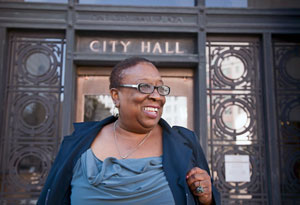How They Discovered Their Dream Careers

Photo: Gabriela Hasbun
PAGE 8
Sick of the diesel exhaust threatening kids' health in her neighborhood, Margaret Gordon stopped scrubbing bathtubs and got to work cleaning the air.
In the early 1990s, Margaret Gordon, a housekeeper and single mom in gritty West Oakland, California, was cleaning the home of eco-activist Michael Herz—founder of the nonprofit San Francisco Baykeeper—when she stumbled upon a stack of environmental magazines. Curious, Gordon asked to borrow a few, and was soon devouring articles about pollution and its adverse effects on health. Gordon had always assumed the green movement was about "kissing birds and saving whales," but the more she learned, the more she realized it was about protecting human beings, too.Her interest became personal when she connected the asthma that plagued her and her grandchildren—and was landing local kids in the hospital at a rate seven times the California average—to the diesel exhaust spewing from nearby freeways and the truck-clogged Port of Oakland, leaving a scrim of "black stuff" on parked cars. Through a local nonprofit, Gordon helped organize a project to gather data on truck traffic and started speaking out at government forums. She logged thousands of hours bringing attention to her community's plight, all while juggling part-time jobs to make ends meet.
In 2004 she cofounded the West Oakland Environmental Indicators Project (WOEIP) to educate local residents about pollution and empower them to fight for necessary protections. The group's hard work paid off in 2005, when it got the city to pass an ordinance rerouting trucks away from residential areas to main roads. Four years ago, the mayor showed his appreciation by appointing Gordon a commissioner of the Port of Oakland, where she now works with shipping companies to negotiate air-quality plans; she's also been named to the advisory committee for the EPA's Clean Air Act. "If you're not at the table," Gordon likes to say, "you'll end up on the menu."
In 2006 Gordon was able to quit her part-time jobs to focus on WOEIP full-time. These days, instead of dusting windowsills, she's drafting neighbors into a new study that tracks air quality using portable sensors to measure pollutants on different blocks. She laughs about the unexpected turn her life has taken. "I'm telling you, none of this was on my radar," she says. "It was something I liked doing, and that people could benefit from. So I embraced it." —Lauren Aaronson
Next: A life in the line of fire



